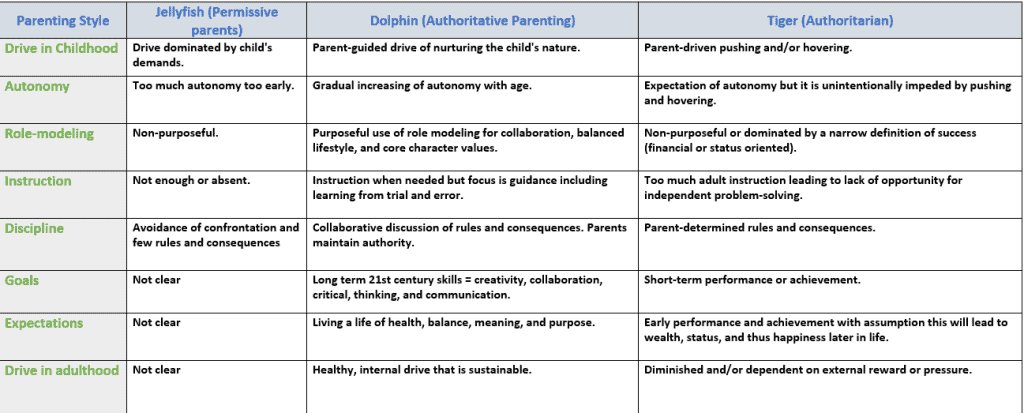The rampant consumption of parenting books has led to the rise in the numbers of parenting experts and guides. With it, the different concepts of parenting have risen dramatically.
Although Baumrind came up with the original concept of four types of parenting styles, the parenting experts, psychologists, and child development experts today have helped redefine the parenting by introducing new concepts. Among these concepts, dolphin parenting is one of the most discussed parenting styles.
The term “Dolphin Parenting” refers to the sea-animal Dolphins known for their utmost love, care, and concern for all kinds of living beings. The term was introduced and first used by Shimi Kang, the author of The Dolphin Way: A Parent’s Guide to Raising Healthy, Happy, and Motivated Kids –Without Turning into a Tiger. Yes, it’s a long title for a parenting book but it does explain the gist of the guide book within its title.
According to Kang, parents should be firm yet flexible and should satiate their children’s desire for health, happiness, and mental well-being. DR. G. SHIMI KANG is also an award-winning, Harvard-trained psychiatrist, media expert, researcher, and a bestselling author.
In her words, dolphin parenting means,
“Maintaining balance in their children’s lives to gently yet authoritatively guide them toward lasting health, happiness, and success.”
Dolphin Parenting vs. Jellyfish Parenting and Tiger Parenting
Dr. Kang also coined the term jellyfish parenting with her parenting guide book. She clearly stated that dolphin parents are exactly opposite to tiger parents. Tiger parenting is authoritarian parenting with strict directives. Along with being strict, parents are protective and indulging just like helicopter parents and lawnmower parents.
Jellyfish parenting is a permissive parenting style where there are high responsiveness and low expectations. Jellyfish parents are the ideal “Focker parents” from “Meet the Fockers” who allow their children to decide themself while providing utmost care, love, and support.
Dolphin parenting is the balance between these two parenting styles. The dolphin parents are both demanding and responsive. The parents are firm yet flexible. According to her, this style of parenting is entirely based on authoritative parenting principles. The parents strictly practice positive discipline with their kids.
Parenting Chart
Dr. Kang also highlighted a comprehensive chart describing the differences between these three parenting styles.

Characteristics of Dolphin Parents
Some of the most recognized characteristics of dolphin parents as highlighted by Dr. Shimi Kang are as follows:
Dolphin Parents Are Not Overprotective
Unlike helicopter and bulldozer parents, dolphin parents aren’t overprotective about their kids. Although they let their children be, it doesn’t imply that dolphin parents let their children off the hook or do not protect them from any damage. It’s about preparing kids to become responsible adults who could willingly face life’s ups and downs.
Dolphin parents allow their children to make mistakes and willingly learn from them without any interference from their parents. Although dolphin parents forbid from dictating their kid’s life terms, they provide assistance and resources to help them decide better. Overprotecting the child is a common characteristic of helicopter parents who do not let their children face any difficulty.
They Do Not Over-Instruct
Unlike authoritarian parents, dolphin parents forbid from directing their children’s lifestyle or needs. Although dolphin parents indulge in their kid’s decisions or choices, they are careful enough to draw a line between over-instructing and assisting.
While parents may want to set certain rules for their child, they should forbid from instructing them on every small matter such as choosing a meal at the diner, picking up the book, etc. Unlike helicopter parents who roam overhead their kids both inside and outside the house, dolphin parents make a clear distinction between the public and private space of their kid. They allow their kids to explore the outside world with little instructions.
Dolphin Parents Are Well Balanced
The term “Balance” here stands for the right attitude! Dolphin’s parents are neither overbearing nor lenient. They are firm yet flexible. It’s important for parents to keep themselves in their kid’s shoes and then decide. Sometimes, letting go is a better option than holding up.
As Dr. Kang points out, “it’s all about striking a perfect balance.” Parents can set strict rules for their kids such as not allowing kids to stay out until late at night or forbidding them from visiting certain places where they are more in the way of harm. However, they should be flexible in exceptional situations such as a friend’s birthday party, school visits, hanging out with friends, etc. Balanced parents often have balanced children who are good in both private and public life.
They Are Supportive
Dolphin’s parents are very supportive of their children. This helps to instill confidence and self-esteem in the kids along with strengthening the bond between parents and children. Being supportive also has another advantage. If your kid wants to share something, he or she will come directly to you and share without the feeling of fear or repercussion.
Unlike parents who practice negative disciplining, dolphin parents are careful about punishing their children. They are more likely to instill respect and accountability in kids. If they land up in trouble, make sure they know what wrong they did and how can they get out of the situation.
They Are Adaptive
Parents should adapt to changing times and expectations. A kid doesn’t always remain a kid, so are the expectations. Parents should be wary that with time their kid will grow up to become a responsible adult. Although they have kept strict rules in place when their kids were young, they cannot apply the same rules when they get into the teenage. Dr. Kang implies that it’s equally important for parents to adapt to the change that’s happening around in terms of parenting. Without challenging the core values and principles of parenting, parents should practice leniency and open-communication with their children. They should start becoming more empathetic, loving, and understanding with the growing age of the kid.
Dolphin Parents Do Not Over-Schedule
Parents often plan a schedule and dictate their children to follow it routinely. It isn’t necessary that your child will fit into and succeed in a certain schedule that worked with other children. What worked for others might not work for them. Parents should burn their kids out with their hectic schedules and routine. If a child feels better about going out to play and doing home assignments after, let them do that. There’s no point sacrificing their game time, probably with neighbor kids, to complete their home assignment immediately after they reach home.
Over-scheduling is commonly practiced by many Asian parents. In India, the concept of enrolling children for coaching classes begins from the tender age of 10-11. Experts are especially concerned if it does any good for the children. Although it may help the kids to achieve a higher grade, good placement in the top college, and a high-paying job, they will eventually burn out themselves. It takes away the essential relaxation and playtime; they yearned for throughout their life.
Although a fairly new concept, dolphin parenting is making rounds in many parenting magazines, guides, blogs, and podcasts. Many parents have started analyzing their parenting style thanks to the concept of dolphin parenting vs. tiger and jellyfish parenting.
